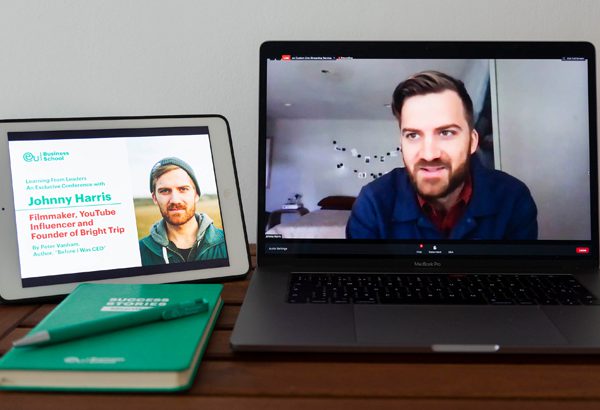Finding Confidence and Overcoming Fear
Pauliina Jamsa is the Global Senior Online Marketing Manager for Siemens. Although she addressed EU Business School students via livestream from London, she is originally from Finland. Pauliina is passionate about diversity and bringing out the best in people. She is a public speaker who has presented in 16 countries, and she is the author of an e-book called “From Anxious to Unstoppable”.
Pauliina began by sharing that she was so badly bullied as a child that she couldn’t even order in a restaurant without worrying people would laugh at her. Although she had the highest grades in school, people believed she was stupid because she didn’t have the confidence to convey her intelligence. Her life changed when she left her small town to study abroad and realized that she wasn’t defined by the opinions of her classmates.
Her message for students was that, if they were suffering from low self-esteem, she had felt the same, and yet had overcome her fears to enjoy great success. She reminded them that, although they may feel that having emotions and a heart is a weakness in business, emotional intelligence is actually a great strength. It is what they’ll need to navigate changes, and it can help them achieve more than they could ever imagine.
Why Is Confidence so Important?
As Pauliina realized in Finland, it isn’t enough to simply be smart. In the business world, you can’t get ahead solely on your talent and technical skills. She shared a range of scenarios in which confidence is needed; for example, when speaking with leaders, when commanding a team, and when pitching or presenting ideas.
Most Common Fears Causing Anxiety
Pauliina shared seven of the most common fears that cause a lack of confidence, and she asked students to consider which fear they related to the most. This is because she believes it’s best to focus on overcoming one fear at once, taking it step by step. The fears discussed were:
Fear of Change
Signs that you live with this fear are that you’re attached to your routine, and you tend to stay in unfulfilling situations rather than risk making a change because you’re nervous about trying new things. People with this fear may feel defensive when others make suggestions for improvement.
Fear of Failure
Ironically, people with this fear often make failure more likely by procrastinating and making excuses for low effort. They’d prefer to deliberately fail than try their best and face real failure. These people also tend to say that they will fail before they even try, in order to set low expectations.
Fear of Success
Those who have a fear of success may not apply for exciting opportunities, convincing themselves that it would mean more stress and pressure that they couldn’t handle. They generally don’t want people to have high expectations for them, and they may feel like success will lead to losing something else; for example, their friendships.
Fear of Rejection
When you suffer from a fear of rejection, you’re likely to avoid confrontation at all costs. This means it’s hard to say no to others and advocate for your own needs. At work, people with this fear will struggle to negotiate contracts or ask for promotion. They will base their decisions on what other people want for them instead.
Fear of Judgement
Everyone cares what other people think; however, people with a fear of judgement are exceptionally aware of other people’s opinions. This often means that they play it safe and don’t stand out in case they get laughed at or criticised. At work, they may turn down opportunities because of how they think other people would react if they took them.
Fear of Not Being Good Enough
At work, this fear may look like constantly trying to do more and being preoccupied with proving yourself. Although other people may be impressed with your achievements, you’re unlikely to see them as especially impressive. People with this fear often fail to pursue opportunities because they believe that if they were really worthy of them, they would already have been offered them.
Fear of Being Exposed as an Imposter
It’s great to be grateful, but people with this fear take it to extremes. They may feel unworthy of the role they have and amazed they ever secured it. They often think that when they’re praised or rewarded, it’s some kind of mistake or misunderstanding. They may find themselves thinking things like “if they knew the REAL me, they’d never have chosen me” or “this was just luck.”
The Six Basic Human Needs
Pauliina asked students to write down what confidence means to them and what they would do if they had all the confidence in the world. She emphasized that confidence looks different for different people: for some, it may look like asking a question in class. For others, it may look like pursuing a leadership position.
Although our ideas of confidence differ, all human beings share the same six basic needs, according to Pauliina. We simply experience them to differing degrees. These needs are at the root of both our hopes and fears.
The six needs mentioned were:
Certainty – the need for stability and routine.
Uncertainty – the need for novelty and surprise.
Love and connection – the need for relationships with others.
Significance – the need for recognition.
Growth – the need for development and education.
Contribution – the need to give back.
Students were encouraged to consider which of these needs were strongest for them and how this interacts with their biggest fear.
Five Practical Methods to Overcome Fear
From her own experiences, Paula offered these suggestions to overcome fear:
1. Be yourself
Remember that confidence can look different for different people. You don’t have to emulate others or be the typical extrovert; there’s power in silence too. Don’t try to “fake it until you make it.” That’s exhausting and only feeds imposter syndrome.
2. Try journaling
You can clear your head before and after important events by writing down all of your thoughts. This can be a great tool to stop you from overthinking. Once you’ve written a thought down, you’re less likely to experience it again.
3. Be prepared
Before events, prepare questions and opinions that you’d like to contribute. Look at the agenda before meetings so you know what is coming up. Read widely so you have original contributions to share about current topics.
4. Write down your successes
It’s always so much easier to remember our failures than our successes. That’s why it’s a good idea to write down personal and professional things you do well. When in doubt or feeling low, you can revisit this list for a boost.
5. Reach out and get help
You’re not alone in feeling fearful or anxious. Remind yourself of that by connecting with friends or family. There are also life coaches and online support groups designed specifically for this purpose.
Although others may look unflappable, everyone suffers from a lack of confidence sometimes. Using Pauliina’s tips, EU Business School students can ensure their nerves don’t prevent them from enjoying success in their careers.









